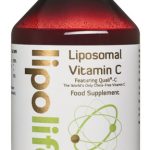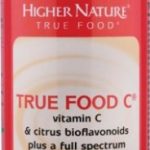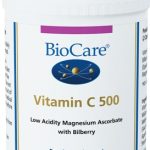Forever associated with orange juice, Vitamin C is perhaps the most easily recalled of all the family of vitamins whose consumption is crucial for our bodies to function exactly as they should. For, should you peel back the surface and break up the segments – yes, as would with an orange – of what Vitamin C does for us, you quickly find it’s impossible not to come to the conclusion it’s essential for healthy human life.
A natural antioxidant that also goes by the scientific name L-ascorbic acid, Vitamin C can actually be found in many fruit and vegetables, certainly not just oranges1. Among all the great things it does inside out bodies, it helps ensure growth and development take place as they should, especially as it aids in the repairing of damaged internal tissue2, 3 and, in helping produce the protein collagen, it plays a pivotal role in keeping the skin, tendons, ligaments, cartilage and blood vessels in good health4.
Additionally, because Vitamin C’s an antioxidant, it inevitably fights oxidisation caused by free radicals (tiny molecules in the body that want to pair off with other molecules as they only possess a single electron, thus causing havoc wherever they go; not least to cells)5. Moreover, the findings of a several-year-long study suggests it promotes heart health6, which maybe isn’t surprising as, like other antioxidants, Vitamin C could well lower people’s risk of developing high blood pressure levels7, 8, 9.
There’s also talk, of course, that Vitamin C may actually be able to boost the immune system; many people believe it even if the research doesn’t quite add up. That said, though, evidence gleaned from animal studies suggests the vitamin may be able to boost the effectiveness of natural therapies for different ailments10.
Are you Vitamin C Deficient?
So, owing to Vitamin C’s patent necessity, it’s now likely occurred to you that surely nobody in their right mind would want to be deficient in it. Yet, usually through ignorance, people are deficient in this and other vitamins; many throughout the Western world. And they should be concerned – after all, the worst case scenario could be developing scurvy. Still to be entirely eradicated, especially in some of the poorest parts of the world, it’s a disease caused by consuming too little Vitamin C and offers up unpleasant symptoms like fatigue, anaemia, poor skin, easy bruising and gum disease7.
More common nowadays is discovering you’ve become Vitamin C deficient due to a medical condition. Common offenders here can be kidney disease, a number of forms of cancer, digestive tract injuries/ inefficiencies14 [11] and smoking13 [12]. Indeed, such ailments will also prevent effective absorption of other nutrients; you probably won’t be surprised to learn13.
Dietary sources of Vitamin C
As noted above, Vitamin C is a naturally occurring entity; it can be consumed – along with many of its fellow vitamins – via eating a number of organic fruits and vegetables, fortified as they are with hundreds of nutrients and minerals.
Top of the Vitamin C charts then is, as you may expect, both orange juice (93mg per ¾ cup) and oranges (70mg per fruit), but in fact both are outstripped by red and yellow bell peppers (95mg per serving), while grapefruit juice (70mg per ¾ cup), kiwifruit (64mg per fruit), green bell peppers (60mg per serving), broccoli (51mg per serving), strawberries (49mg per serving) and Brussels sprouts (48mg per serving) follow up behind11 [13]. All of which proves just how plentiful and diverse the opportunities for boosting your Vitamin C intake are via tweaks to your diet.
Supplement sources
Unfortunately, for different reasons, some people aren’t able to make effective dietary changes to up their Vitamin C levels, but all’s not lost – another highly advised, highly efficient way to boost your intake is through supplementation. And don’t doubt it; the natural way is always the way to go. Why? Because unlike their synthetic counterparts, these supplements make use of ingredients sourced from nature itself and so offer the vitamin – and other nutrients and minerals – in an entirely naturally-occurring, thoroughly healthy manner.
To that end, the following are all Vitamin C supplements you may well consider worthwhile; they and all those to be found via the ‘Vitamin C’ page on our website can be purchased through us here at The Finchley Clinic:
 Liposomal Vitamin C – delivers the all-important nutrient via new supplement technology, the vitamin’s blended with phospholipids (a lipid combined with phosphorous) to ensure the Vitamin C reaches the body’s cells easier and more effectively.
Liposomal Vitamin C – delivers the all-important nutrient via new supplement technology, the vitamin’s blended with phospholipids (a lipid combined with phosphorous) to ensure the Vitamin C reaches the body’s cells easier and more effectively.
 True Food Vitamin C – easily digested and absorbed for high bioavailability and comes in an agreeable vanilla-flavour tablet form; supplementation with Omega oils is advised.
True Food Vitamin C – easily digested and absorbed for high bioavailability and comes in an agreeable vanilla-flavour tablet form; supplementation with Omega oils is advised.
 BioCare Vitamin C – a bio-available source of Vitamin C with magnesium and bilberry extract, the latter comprising flavonoids, a potent source of antioxidants.
BioCare Vitamin C – a bio-available source of Vitamin C with magnesium and bilberry extract, the latter comprising flavonoids, a potent source of antioxidants.
References:
- ‘Vitamin C’. MedlinePlus. U.S. National Library of Medicine, 9 Mar 2016.
- Zeratsky, K. ‘Too Much Vitamin C: Is It Harmful?’. MayoClinic.org. Mayo Clinic. 5 Feb 2015.
- ‘Wounds’. University of Maryland Medical Center. University of Maryland. 5 Jan 2015.
- Boyera, N., Galey, I. and Bernard, B. A. ‘Effect of vitamin C and its derivatives on collagen synthesis and cross-linking by normal human fibroblasts’. International Journal of Cosmetic Science, 20: 151–158. doi: 10.1046/j.1467-2494.1998.171747.x. June 1988.
- Lynch, S. R. and Cook, J. D. ‘Interaction of Vitamin C and Iron.’ Annals of the New York Academy of Sciences, 355: 32–44. doi: 10.1111/j.1749-6632.1980.tb21325.x. 1980.
- Osganian, S K.., Stampfer M. J., Rimm E., and Spiegelman D. ‘Vitamin C and Risk of Coronary Heart Disease in Women’. ACC Current Journal Review 12.5: 27. PubMed. July 2003.
- ‘Vitamin C (Ascorbic Acid)’. University of Maryland Medical Center. University of Maryland. 16 July 2013.
- Juraschek, Stephen P et al. ‘Effects of Vitamin C Supplementation on Blood Pressure: A Meta-Analysis of Randomized Controlled Trials’. The American Journal of Clinical Nutrition 95.5 (2012): 1079–1088. PMC. 11 Mar. 2016.
- Ness, A. R., Chee D., and Elliott P. ‘Vitamin C and Blood Pressure–an Overview’. J Hum Hypertens Journal of Human Hypertension 11.6: 343-50. PubMed. June 1997.
- ‘High-Dose Vitamin C’. National Cancer Institute. National Cancer Institute. 11 Dec. 2015.
- Hoffman, F. A. ‘Micronutrient Requirements of Cancer Patients’. Cancer 55.S1 (1985): 295-300. PubMed. Jan 1985.
- ‘Vitamin C Fact Sheet for Consumers’. National Institutes of Health. U.S. Department of Health & Human Services. 17 Feb. 2016.
- Bobroff, L. B., and Valentin-Oquendo I. ‘Facts About Vitamin C’. University of Florida IFAS Extension. University of Florida, n.d.. 11 Mar 2016.
